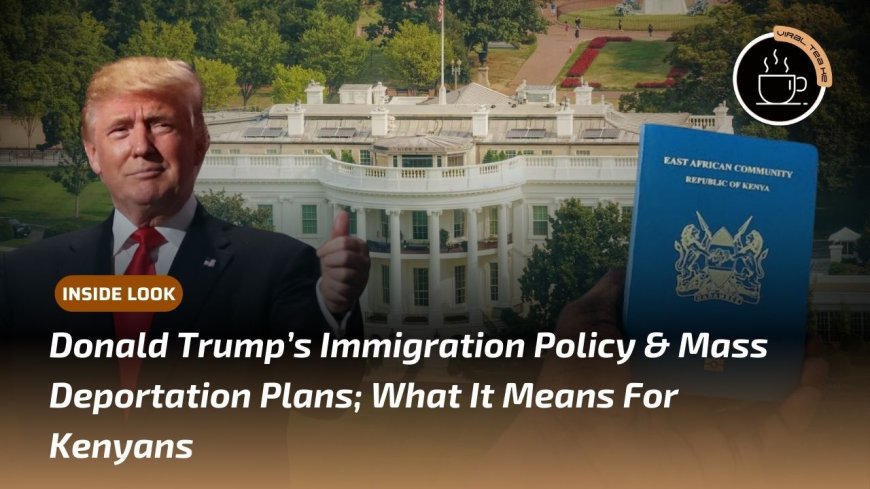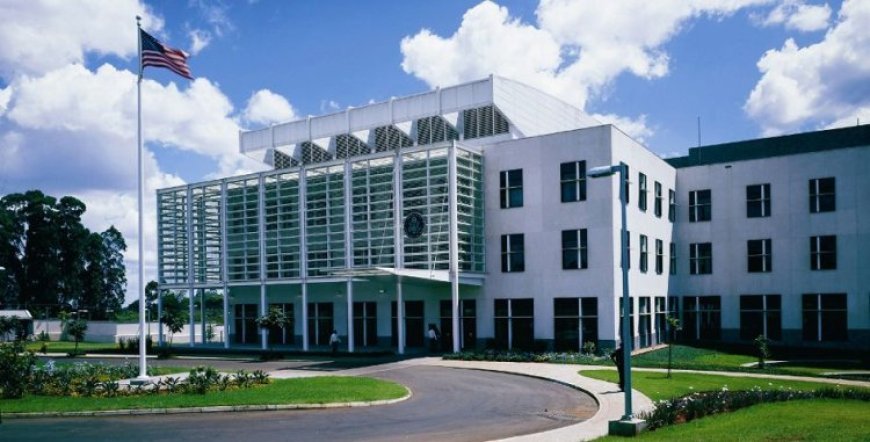Inside Trump Policy That Will Make US Less Attractive For Kenyans
Even though Kenyans online supported Trump in their numbers over Harris, there are now concerns that Trump's immigration policy could lock out Kenyans seeking opportunities in America

With Donald Trump set to be elected as the 47th President of the United States (POTUS), defeating incumbent Vice President Kamala Harris, Kenyan communities will likely look at Trump's second tenure with a sense of anxiety, especially those seeking to live, work and study in the US.
Trump is expected to mobilize agencies across the U.S. government to help him deport record numbers of immigrants, building on efforts in his first term to tap all available resources and pressure so-called "sanctuary" jurisdictions to cooperate, according to six former Trump officials and allies.
Even though Kenyans online supported Trump in their numbers over Harris, there are now concerns that Trump's immigration policy could lock out Kenyans seeking opportunities in America at a time when most superpower countries are imposing restrictions to cut down on the number of immigrants.
Why It Matters
If elected president, Donald Trump’s immigration plans could mean international students choose other countries, and many aspiring immigrants will find themselves out of luck. With analysis of Trump’s first term and his expected advisers’ plans in a possible second term indicates that new policies will have a profound effect on employers, students and high-skilled professionals.

US President-elect, Donald Trump. /ASSOCIATED PRESS
During his first term, Trump's administration was dominated by a string of hardline immigration policies. These included withdrawing from the Paris Climate Accord, imposing a travel ban on citizens from several Muslim-majority nations, and raising import tariffs.
He made some headway on campaign promises like building a wall along the US-Mexico border and having Mexico foot the bill, but these ultimately fell short. While some of these policies were challenged in court or met with resistance from government officials, Trump’s proposed plans for his second term paint a more extreme picture, leaving many worried about the future of US immigration.
Key Concern
For starters, Trump's policies may include restricting Optional Practical Training (OPT) for international students and measures that cause individuals to wait years for employment-based green cards to leave the United States.
Using the federal government to limit or reduce the labour supply was the operating principle behind many of the Trump administration’s first-term immigration restrictions. Based on the “lump of labour fallacy,” which assumes (economists say incorrectly) that new workers must compete for a fixed number of available jobs, the Trump administration blocked the entry of immigrants and visa holders during the Covid-19 pandemic, put new immigration obstacles in the path of foreign-born scientists and engineers and enacted other policies.
The Trump administration placed on the regulatory agenda a rule to restrict Optional Practical Training, which allows international students to gain experience by working in their field for 12 months. The Barack Obama administration however issued a rule that permitted students in science, technology, engineering and math fields to extend OPT for an additional 24 months.
The rule was needed due to legal challenges after the George W. Bush administration introduced Science, Technology, Engineering, and Mathematics Optional Practical Training (STEM OPT). Bush officials hoped STEM OPT would help the United States attract international students and give employers and students additional opportunities to gain H-1B status in the annual lottery.
Under the second Trump administration, this restriction could be revived after it failed to take off during the first Trump administration, a significant worry for Kenyan students seeking to leverage OPT to gain a foothold in the US job market.
Deportation
Another drastic plan by Trump is his proposal to initiate the "largest domestic deportation operation in American history" which should send shivers down the spines of Kenyan immigrants.
Trump backers - including some who could enter his second administration - anticipate the Republican president-elect will call on everyone from the U.S. military to diplomats overseas to turn his campaign promise of mass deportations into a reality. The effort would include cooperation with Republican-led states and use federal funding as leverage against resistant jurisdictions.
Trump recaptured the White House vowing a vast immigration crackdown. The centrepiece of his reelection bid was a promise to deport record numbers of immigrants, an operation Trump’s running mate JD Vance estimated could remove 1 million people per year.
Immigrant advocates warn that Trump’s deportation effort would be costly, divisive and inhumane, leading to family separations and devastating communities. Such an aggressive measure, which also could see the authorization of Immigration and Customs Enforcement (ICE) raids on workplaces, could create a toxic environment for all immigrants, regardless of their legal status, making the US a less attractive destination for Kenyans seeking opportunities abroad.
Making matters even worse is Trump's goal to end birthright citizenship for children born to undocumented parents, a policy which would require at least one parent to be a US citizen or lawful permanent resident for their child to gain automatic citizenship, which could significantly impact Kenyan families hoping to secure a future for their children in the US.
Currently, children born in the US to Kenyan parents on visas like the H-1B, which allows trained foreign workers to temporarily reside in the US, are automatically granted citizenship. With this potential change, the future for children of Kenyans working in the US becomes uncertain.
Kenyans already face an extremely difficult challenge in terms of securing US visas, especially the coveted Green Cards that grant permanent residency. The current system, with its annual cap of 140,000 employment-based green cards and a per-country limit of 7 per cent, has resulted in a massive backlog, especially for Kenyan applicants.
If Trump's aim to restrict both legal and irregular immigration materialises, these backlogs are likely to worsen, pushing the American dream further out of reach for many Kenyans and killing the dreams of Kenyans eyeing the US for a better life for themselves.

President William Ruto and his outgoing US counterpart, Joe Biden inside the White House on May 23, 2024. /PCS
Harder To Get In
Another possible hurdle for Kenyans is the burdening of OPT with requirements that make it untenable for students and employers. That was the model with H-1B visas.
The Trump administration enacted measures that raised denial rates, costs and uncertainty until judges ruled the policies unlawful, forcing a legal settlement. Trump officials also published an H-1B rule that would have made the category unusable for many employers.
A court blocked the rule on procedural grounds, but the possibility of their return or the introduction of new restrictions in the second Trump regime could significantly impact Kenyan students' chances of securing long-term employment in the US.
Additionally, Trump's proposed policies could also have unintended consequences for Kenyan professionals already working in the US on H-1B visas and waiting in the green card backlog. One proposed policy involves raising the minimum wage requirements for H-1B visa holders and employment-based immigrants, potentially pricing them out of the job market.
Another potential issue is the possible curtailment of work authorization for spouses of H-1B visa holders. This policy, if implemented, would make it much harder for families to remain in the US while waiting for their green card applications to be processed.
So, What Next?
While the incoming Trump administration could benefit from the experience gained during his first term, it could again encounter resistance from ideologically opposed government employees, including officers who screen migrants for asylum. For instance, the American Civil Liberties Union and immigrant advocacy groups have been preparing for court battles if Trump again tests the bounds of his legal authority.
Lee Gelernt, an ACLU attorney who led the fight against Trump’s contentious family separation policy, said more than 15 lawyers focused on immigration with the organization’s national office spent the year preparing for the possibility of a Trump return. “We need to be coordinated and have more resources, because I think they will come in much more prepared,” Gelernt was quoted by Reuters. The State Department in particular could be one place where Trump acts more aggressively than during his first term, according to several Trump backers.
Another key factor will be whether other countries will accept their citizens, an issue Trump faced with limited success during his first term. The Trump administration also struggled at times to convince other nations in the region - including Mexico - to take steps to stop migrants from moving toward the U.S.-Mexico border.
The second Trump administration should be prepared to face resistance from other countries, including Kenya, which might tighten immigration policies on US citizens in retaliation to Trump's aggressive policies, a matter which could put the 60-year-old relations between Kenya and the US at risk.
Immigration attorneys also worry about new restrictions that affect international students should Trump become president, not the implementation of expansive policies. “My biggest concerns are about discouraging international students and scholars from coming to the United States,” said Dan Berger of Green & Spiegel. “During the last Trump administration, the visa process got harder, with processing times going up, longer security checks and many more questions.” He pointed to the “Muslim ban,” policies during Covid-19 and other measures that created uncertainty and had “a chilling effect on attracting international talent.”
“A new Trump administration might try to crack down on H-1B work visas in a variety of ways, including higher denial rates, longer processing times and making the eligibility requirements more restrictive,” according to Cornell Law School professor Stephen Yale-Loehr, an advisor to the National Foundation for American Policy. “Since H-1Bs are a common way international students seek to stay and work in the United States after they graduate, any H-1B restrictions would heighten their worries, such that they might be less likely to come to the United States in the first place.”
However, while Trump's immigration policies have drawn criticism from various quarters, including human rights groups and legal experts, they resonate with a segment of the American population concerned about job security and national security. The former president’s promise to crack down on immigration has appealed to those who believe that immigrants are taking jobs from Americans and contributing to social problems.
Trump's victory still presents a challenging landscape for Kenyans aspiring to study or work in the US. The proposed immigration policies, coupled with the existing backlogs in the green card system, suggest a future where obtaining US visas and navigating the immigration process will be more difficult than ever, meaning that Kenyans could rapidly shun the US for work, immigration and study opportunities and lean towards underrated countries with better immigration policies, a massive blow to American companies which began turning towards other countries for fresh talent.







